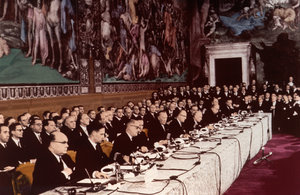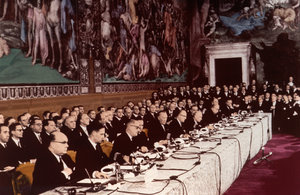EU: for once it’s safer to look back than forward

 The EU has always managed to keep a sense of perspective thanks to it history. The European Coal and Steel Community, and the Treaty of Rome that marked the founding of the EEC – 50 years ago tomorrow – were based on the need to ensure European countries never again went to war. Yet the need has always been to move forward – meeting the next challenge, the next effort required to make the multi-state bloc more effective.
The EU has always managed to keep a sense of perspective thanks to it history. The European Coal and Steel Community, and the Treaty of Rome that marked the founding of the EEC – 50 years ago tomorrow – were based on the need to ensure European countries never again went to war. Yet the need has always been to move forward – meeting the next challenge, the next effort required to make the multi-state bloc more effective.
Even at previous low points – the wrangles to agree the Treaty of Nice for example – there has always been a gleam of light for the Heads of States and Governments, always a way out of the present predicament. Throughout the 1980s and much of the 1990s Delors, Mitterand and Kohl could be relied upon to develop bold policy ideas for Europe.
But where are we now as the EU marks 50 years? For once it is more reassuring to look back. The BBC has been doing plenty of that, with some very interesting historical articles about the drafting of the treaty and the ceremony in Rome. In historical perspective the Treaty of Rome has been massively significant.
Will the vague and anodyne Berlin Declaration (news on it from EUObserver) be anything but a small footnote to the EU’s history? I doubt it. Will anyone consider Angela Merkel, Jacques Chirac, Tony Blair as a generation of European leaders who made significant progress for the continent? With the shadow of referndums hanging over any plans for the future, could the EU even manage to draft something like the Treaty of Rome ever again?
So let’s pause, reflect and be content about what we have achieved in this European Union. For the near future gives us few grounds for optimism.